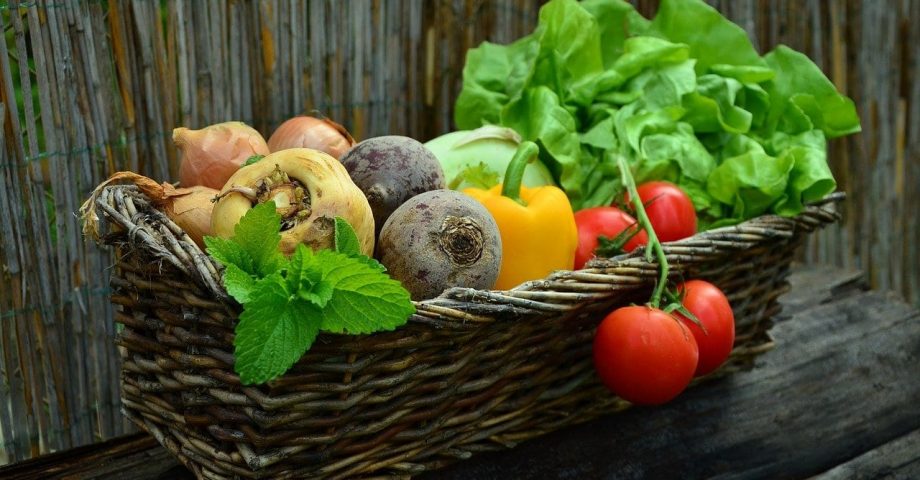36 Nutritious Facts about Vegetables
Vegetables are one of nature’s greatest gifts! Vegetables are a valuable protective food essential for the prevention of diseases and maintenance of health. With the help of these miracle workers and a bit of discipline, we can reach a perfectly well-balanced diet.
Rich in fibre, vitamins and minerals, and packed with crucial immune-boosting antioxidants, vegetables are the real deal! Before you start planning today’s menu, here are some interesting facts about vegetables that’ll might help you decide what to include in your vegetable servings… Bon appetite!
1. Veggies can help to improve your health all around.
Countless studies have linked the benefits of greater veggie intake to a reduced risk of chronic disease, heart disease, diabetes, and lifestyle-related cancers.
2. Vegetables can keep you hydrated.
Since veggies contain lots of water, they are also essential for hydration and digestion while consecutively delivering fuel for your body’s useful bacteria.
3. Veggies are the edible bits!
Vegetables are parts of plants that we use as food.
The term vegetable generally refers to the edible pieces of certain herbaceous plants, roots, stems, leaves, flowers, fruit, or seeds.
These plant parts are either eaten fresh or prepared in many ways, usually as a savoury, rather than a sweet, dish.
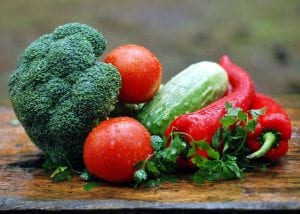
4. It’s taken us centuries to enjoy vegetables the way we do.
Initially, vegetables were gathered from the wild by hunter-gatherers, and during the period from 10,000 BC to 7,000 BC, people started growing them in several parts of the world, probably when a new agricultural way of life developed.
5. That thing about carrots – it might be true!
Carrots help our vision because they’re rich in vitamin A.
6. Broccoli is crammed with good stuff.
Broccoli’s healthy rep comes from its low calories and high micronutrients, including vitamin C, vitamin A, and vitamin K.
7. Mushrooms are amazingly good for you.
Do you need help with cognition, heart health, and disease prevention? Then, start eating mushrooms.
8. Why not swap meat for mushrooms?
If you replace meat with mushrooms it will positively affect your body weight and overall health.
9. Kale is a superfood.
Your favourite leafy green kale is chock-full of vitamin K, just ½ cup provides about 440% of the recommended daily value!
A portion of kale also supplies 10% of your daily value for calcium. Good to know if you’re lactose intolerant!

10. Line up spinach for your vitamin A fix.
Tons of vitamin A can be found in spinach, over half of the recommended daily amount in a portion!
Spinach helps boost and improve our immune system. If it’s good for Popeye then you should consider adding this leafy green to your diet.
11. Asparagus is another great choice for fewer calories and stacks of vitamins.
Asparagus contains only a few calories but lots of fibre and micronutrients such as folate, vitamins C, A, and K.
12. Lentils are ideal meat alternatives in many cases.
Lentils are both a vegetable and a protein, which makes them a smart and budget-friendly choice.
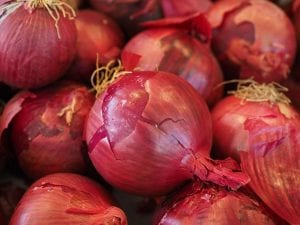
13. You’ll get stacks of fibre from beans.
Legumes (beans) provide loads of fibre, 50% of our daily foliate, and 45% of our daily iron recommendations.
A good source of vitamins A, C, K, and fibre, are green beans.
14. Cauliflower is surprisingly rich in potassium.
Using cauliflower is an easy way to sneak in extra vitamin C, potassium, and plant-based omega-3 to your meal.
15. Beetroot is great for reducing inflammation.
Beets are an anti-inflammatory and antioxidant vegetable with a positive effect on blood pressure and oxidative stress.
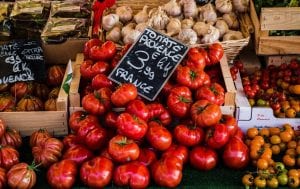
16. Which pepper do you pick?
Bell peppers can be green, red, purple, or yellow. Red peppers pack the most nutrition, and in comparison to green bell peppers, they’ve got almost 11 times more beta-carotene and 1.5 times more vitamin C.
17. Tomatoes are common stateside.
Originally grown by the Aztecs and Incas as early as 700 A.D., the tomato is native to the Americas. In fact, more tomatoes are consumed in the U.S than any other single fruit or vegetable!
Europeans were first aware of the tomato in the 16th century when explorers brought back seeds from Mexico and Central America.
18. Weirdly enough, tomatoes have lots in common with various other veg.
The tomato is in the same family as the potato, pepper, eggplant, and petunia.
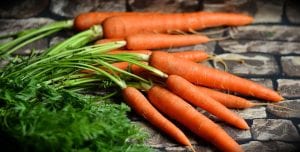
19. The French have an odd name for the tomato.
The “apple of love” is how the French used to refer to tomato.
20. Tomatoes could help you fight cancer.
P-coumaric and chlorogenic acids are the two cancer-fighting substances in the tomato. Tomatoes are also a good source of vitamins A and C.
21. Tomatoes are impressively versatile.
Tomatoes can be prepared stuffed, baked, boiled, stewed, pickled, and fried, and are the base for many sauces.
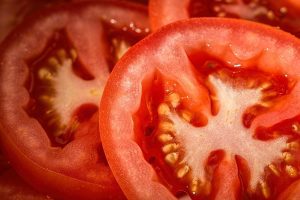
22. Tomatoes can help keep your heart healthy.
The lycopene in the tomato supports vascular health and helps prevent cardiovascular disease.
23. The tomato is a vegetable by law!
The tomato was actually a fruit. It took a ruling by the Supreme Court in 1893 to make the tomato a vegetable for taxation purposes.
24. Onions are great all-around boosters.
Onions improve the flavor of whatever you’re cooking, but they also contain a flavonoid called quercetin, which has been shown to improve mental and physical performance. A win-win situation!
Onions are super-healthy and an essential source of vitamin C, sulphuric compounds, flavonoids and phytochemicals.
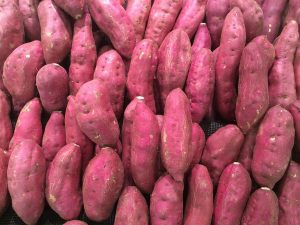
Sweet potatoes
25. Grab sweet potatoes for anti-oxidants.
Sweet potatoes are one of the best sources of beta-carotene, an antioxidant that converts into vitamin A.
26. Go purple for more heart protection.
Eggplant is a versatile vegetable and contains cardioprotective combinations for a healthier heart.
27. Leafy greens are also great for oxygenating the blood.
Carrots, spinach, sweet potatoes, and collard greens are high in carotenoids.
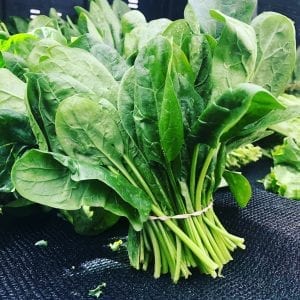
28. One state is responsible for most of the US broccoli.
Almost the entire broccoli crop sold in the United States is produced in California.
29. Keep the skins on the spuds!
A baked potato with its skin is a good source of dietary fibre, 4 grams. However, most of the nutrients in a potato are just below the skin layer.
30. Ireland’s potato shortages killed hundreds of thousands.
The potato disease “Late Blight” was the principal cause of the Irish Potato Famine, which killed a half million people.

31. Potatoes are a big part of ancient South American history.
The potato was originally cultivated by local tribes in South America’s Andes Mountains.
32. Europeans didn’t get to try potatoes until the 1700s.
Potatoes found their way to Europe during the 16th century – by the end of the 17th century, the potato had become an important crop in Ireland.
Today, potatoes are grown in over 100 countries and all 50 of the United States. However, Germans eat twice as many potatoes as Americans.
33. You’ll get plenty of vit C from a tater.
In a medium-sized potato, 35% of an adult’s daily requirement of vitamin C can be found.
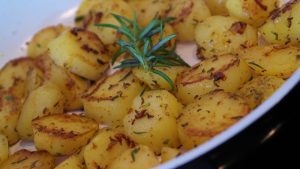
34. Do you keep your spuds in the fridge?
Potatoes do not have to be stored in a refrigerator, but they should be kept dark and dry.
35. Potatoes are largely H2O!
Potatoes are only 20% solids…and 80% water.
36. Five vegetable servings a day is the way to go.
For longer life, it’s suggested that you eat five servings of vegetables a day. A serving equals one-half cup. So, what are you waiting for, start preparing your veggie menu for the day!
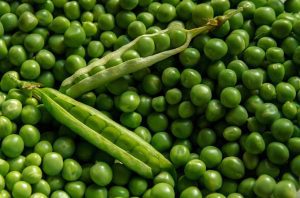
FAQs about Vegetables
Are there different types of vegetables?
Yes - there are eight types, on the whole - orange vegetables, beans, starch, leafy, pod, tuber, flower, and miscellaneous!
Is a mushroom a vegetable?
Mushrooms often get labelled as vegetables, but there are technically fungi, and aren’t connected to plants at all.
Is rice a vegetable?
No - rice is technically a grain, and therefore a carbohydrate.
Do you know any fun facts about vegetables? Share them in the comments below!
This page was last modified on July 28, 2023. Suggest an edit
